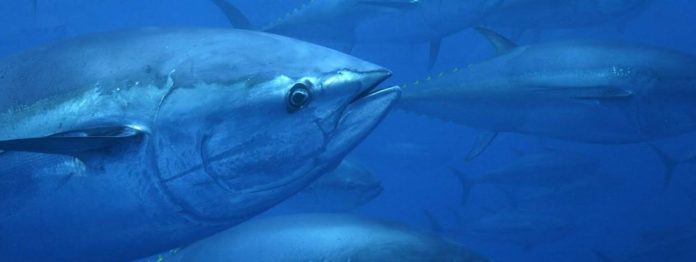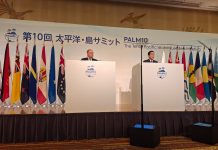By Rebecca Kessler
UN member states failed on 18 March to finalise a legally binding tool to sustainably manage the largest ungoverned place on the planet: the high seas. The lack of agreement came after almost two weeks of talks in New York, three previous conferences, and more than a decade of discussion.
Almost 27,000 unique species, including fish, mammals, reptiles, birds and invertebrates, have been found in these vast waters covering almost half the surface of the planet, according to the Ocean Biodiversity Information System. And those are just the ones we know about.
These resource-rich international waters span about two-thirds of the ocean. Exclusive economic zones (EEZs) governed by states with adjacent coastlines make up the rest. However, ocean life does not respect these boundaries. What happens in the high seas affects EEZ ecosystems and fish catch profits, and vice versa.
But the high seas come under the jurisdiction of no one, and there is no comprehensive agreed framework governing resource exploitation or conservation there.
“We can’t have 95% of our global commons left as gangland without the rule of law,” Helen Clark, the former prime minister of New Zealand and an ocean advocate, tweeted shortly before the inability of the talks to reach an agreement became public. “And unfortunately, that’s the risk you run, when you don’t have specific provisions in international law for those areas that are beyond national jurisdiction.”
The intergovernmental conference aimed to unify states globally to take responsibility for international waters in an equitable way that preserves fish stocks and other shared resources for future generations.
This was the fourth of four diplomatic sessions planned since 2017. It marked the resumption of talks after a two-year delay due to the COVID-19 pandemic, and hopes were high it would finalize a legally binding treaty.
Delegates from the 193 UN member states attended the recent talks, trying to iron out kinks across four key areas: equitably sharing of marine genetic resources (MGRs); implementing area-based management tools like marine protected areas (MPAs); setting standards for environmental impact assessments for activities on the high seas; and assisting developing countries to effectively meet treaty objectives by sharing knowledge and marine technology with them.
“Frankly, they ran out of time,” Liz Karan, project director of the high seas conservation program at Washington, DC-based public policy group Pew Charitable Trusts, told Mongabay. “There was no one issue that prevented final agreement, but rather the pace of negotiations was slow and not all the draft text was even able to be discussed.”
Stumbling blocks to an agreement
Consensus remained snagged on stumbling blocks persistent throughout the three previous negotiation sessions.
How the treaty might interact with the many regional organizations, including fisheries management bodies, that are already in place when establishing MPAs was “a real sticking point,” according to Karan. To succeed, the talks need to work out how to address the piecemeal nature of the conservation mandates of existing bodies and unify efforts holistically, she said, “but there are those countries and sectoral interests that don’t want to change the status quo.”
Views remain “polarised” on how to equitably manage MGRs, Mirella von Lindenfels, director of UK-based marine science think tank International Programme on the State of the Ocean (IPSO), who attended the negotiations in a civil-society capacity, told Mongabay.
Broadly defined by the Convention on Biological Diversity as any genetic material of actual or potential value to humans that originates in the ocean, MGRs cover anything from microbes to algae to whales. Medicines and other products derived from MGRs are valuable for having the potential to both save lives and be profitable. Yet many developing countries, despite having equal claim on high-seas MGRs, don’t have the resources to conduct scientific research on the high seas, find genetic resources and develop commercial products. Delegates sought, but failed, to agree on how to extend access to these countries.
Something fishy
Although fish are one of the main resources extracted from the high seas, and subject to much illegal exploitation there, several delegates were keen to exclude fisheries from the treaty altogether.
“This is purely driven by commercial interests,” Tom Pickerell, director of UK-based Global Tuna Alliance, a group of seafood companies championing sustainable tuna industry standards, told Mongabay. “It is, of course, a silly view, as better ecosystem management will ultimately benefit commercial fish stocks, as well as ocean health,” Pickerell said.
Still, he said, the final treaty is unlikely to govern fisheries access or allocation.
The treaty negotiation comes under the auspices of the Convention on the Law of the Sea, which is not an environmental agreement. Delegates in the room were likely being guided by their defense, agriculture, fisheries and trade ministries, as well as their environment ministries, according to Karan, who attended as an NGO observer, and they often have scant environmental background themselves.
The complexity of the elements at play means that many states rely on a “treaty tracker” from the High Seas Alliance. This group of more than 40 conservation NGOs, including IPSO and Pew Charitable Trusts, together with the International Union for Conservation of Nature (IUCN), help delegates understand the environmental details of what has been said in plenary sessions: they “represent the ocean in the room,” Lindenfels said. However, this session, civil society was not granted access to the talks until week two due to COVID-19 restrictions, so the High Seas Alliance monitored negotiations via webcast and ran briefing sessions for delegates from a meeting room in a nearby hotel.
Pressure to finalise the treaty in 2022
A legal process to establish a network of marine protected areas on the high seas would be the single most important outcome of this treaty, Karan said. But trying to create a network of MPAs using an agreement that couldn’t say anything about fish would be problematic, and observers say it may be a real possibility.
Around one percent of the high seas currently falls within MPAs. Globally, MPAs cover almost 29 million square kilometers (just over 11 million square miles), which may sound like a lot, but is actually only 7.7% of the ocean. Scientists agree this is not enough, and say we need to protect at least 30% of the ocean to safeguard biodiversity.
The UN’s Post-2020 Global Biodiversity Framework, another draft treaty, aims to facilitate just that, by 2030. Due to be finalised in May at the COP15 biodiversity summit in China, the framework contains a goal nicknamed “30 by 30.” Implementation of 30 by 30 currently depends on the completion of a high seas treaty for a legal mechanism to create MPAs in the high seas. Without this, countries would need to designate almost all the EEZs on the planet as MPAs to reach that target. And that is just not going to happen.
“To protect that 30% by 2030 we need the high seas treaty now,” Karan said, because it takes time to ratify a treaty, and until that’s done, the lengthy process of proposing high-seas MPAs can’t even begin.
What now?
Almost 50 countries, including the entire EU, joined a “High Ambition High Seas Coalition” set up in January and pledged to agree on a treaty for the high seas before the year is out. Notable absences include China and the U.S.
Observers of the recent negotiation agreed the majority of delegates made a genuine effort to finalise the treaty. They said the general mood was disappointed but hopeful, as a strong agreement later in the year is possible. Talks are not deadlocked, they said, just complicated and out of time for now.
“Every day that we don’t have a treaty is a day lost to ocean and climate protection,” Lindenfels said. “We must complete this treaty in 2022 and states should do everything in their power to ensure that happens.”.
SOURCE: MONGABAY.COM


















